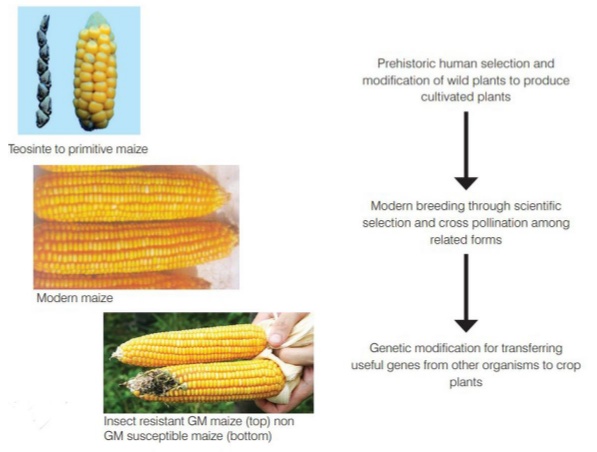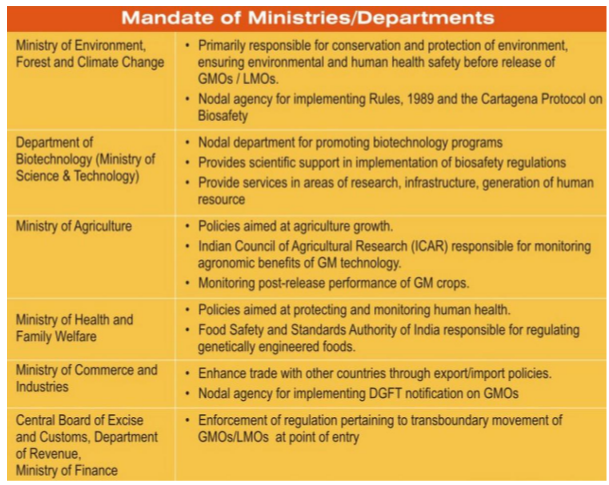Context:
Genetically modified food remains controversial, especially in Europe, but for some experts it is the best science-based method for a sustainable global food system amidst biodiversity loss and a rising population.
| Probable Question:
Q. By resisting genetically modified crops, India risks food security of its population and may fall behind the rest of the world where scientists are deploying gene editing tools to improve yields. Critically evaluate. |
What are genetically modified crops and organisms?
- GMO: A genetically modified organism (GMO) is any living organism whose genetic material has been modified to include certain desirable techniques.
- Genetic modification has previously been used for the large-scale production of insulin, vaccines, and more.
- GM crops are those crops that involve genetic modification with the manipulation of DNA to alter certain characteristics of the crop.
- To genetically modify a crop, the gene of interest is identified and isolated from the host organism. It is then incorporated into the DNA of the crop to be grown. The performance of the GM crop is tested under strict laboratory and field conditions.
- Soyabean, maize, cotton, and canola with herbicide tolerance and insect resistance are the most widely grown GM crops around the world.
- Other common genetically modified characteristics include virus resistance, drought resistance, and fruit and tuber quality.

Image credit: GEAC
What is the Genetic Engineering Appraisal Committee (GEAC)?
- It is a body under the Ministry of Environment, Forest and Climate Change (MoEF&CC), responsible for the assessment of proposals related to the release of genetically engineered organisms and products into the environment, including experimental field trials.
- GEAC or people authorised by it have the power to take punitive actions under the Environment Protection Act.
Regulatory framework in India:
- Strict regulations are in place to control threats to animal health, human safety, and biodiversity at large during the processes of development, cultivation and transboundary movement of GM crops.

Image credit: GEAC
Acts and rules regulating the GM crops in India include:
- Environment Protection Act, 1986 (EPA)
- Biological Diversity Act, 2002
- Plant Quarantine Order, 2003
- GM policy under Foreign Trade Policy
- Food Safety and Standards Act, 2006
- Drugs and Cosmetics Rule (8th Amendment), 1988
Activities Covered:
- All activities related to research and development of GMOs
- Field and clinical trials of GMOs
- Deliberate or unintentional release of GMOs
- Import, export, and manufacture of GMOs
GM crops in India:
Bt Cotton:
- India introduced Bt cotton seeds in 2002.
- Bt modification is a type of genetic modification where the Bt gene obtained from the soil bacterium Bacillus thuringiensis is introduced into the target crop – in this case, cotton.
- Bt cotton is resistant to bollworm, a pest that destroys cotton plants.
- As a result of the adoption of Bt cotton, India is now the largest cotton producer in the world.
- By 2014, around 96% of the area under cotton cultivation in India was Bt cotton, making India the fourth-largest cultivator of GM crops by acreage and the second largest producer of cotton.
- It has greatly reduced the use of toxic pesticides.
GM mustard:
- Dhara Mustard Hybrid (DMH -11) was developed by a team of scientists under a government-funded project.
- It uses a system of genes from soil bacterium that makes mustard — generally a self-pollinating plant — better suited to hybridisation than current methods.
- In September 2017, a feasibility report said that the developers of DMH-11 claimed a yield increase of 25-30% over non-hybrids, which was refuted by several NGOs.
- The GEAC cleared the environmental release of mustard hybrid Dhara Mustard Hybrid (DMH-11) for its seed production and testing as per existing ICAR guidelines and other extant rules/regulations prior to commercial release.
Advantages of GM Crops:
- Rise in farm production: It improves production and raises farmer’s income. Indian farmers are still practising the traditional process of seeding and cultivation, which requires scientific moves for raising their production.
- It reduces the use of pesticide and insecticide during farming that might be great moves for the betterment of the food supply.
- Food security: It can feed a rapidly increasing population because it shows dramatically increased yields. Hence, many scientists and agricultural experts have called for faster clearance of GM crops in India, where farms are shrinking due to rapid urbanisation and erratic weather patterns threatening the output of staples such as rice and wheat.
- More from less: It can produce more in a small area of land.
Disadvantages of GM Crops
- Input expenses: It increases the cost of cultivation and is more inclined towards marketization of farming that works on immoral profits.
- Threat to Biodiversity: The production imposes high risks to the disruption of ecosystem and biodiversity because the better traits produced from engineering genes can result in the favouring of one organism. Hence, it can eventually disrupt the natural process of gene flow.
- Health risk: It is biologically altered. The technology is mostly carcinogenic. It is a killer technology that kills soil, microbes, pollinators, almost all medicinal herbs and adversely affects crop diversity. It can also cause cancer in humans.
- Pest resistance: The excessive production of genetically modified foods will be rendered ineffective over time because the pests that these toxins used to deter might eventually develop resistance towards them.
- Unsuitable For Indian conditions: The Supreme Court’s own Technical Expert Committee [TEC] had said that these GM crops were not meant for agriculture in the Indian context. They may be suitable in the western context where there are large farms.
Way Forward
- Regulatory certainty:
- Taking up the proposed Biotechnology Regulatory Authority of India Bill again is a must.
- Government should start with transparency; bringing biosafety data in the public domain.
- Recommendations by GEAC
- Environmental release of mustard hybrid DMH-11 for seed production and testing as per existing ICAR guidelines.
- Conduct field demonstration studies with respect to the effect of GM mustard on honey bees and other pollinators post-environmental release.
News Source: Indian Express
![]() 5 Jun 2023
5 Jun 2023

